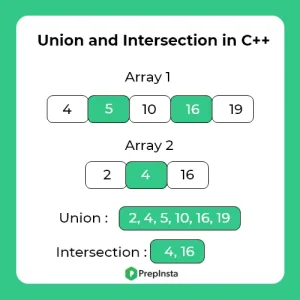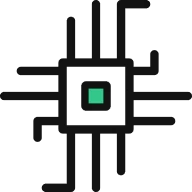Notification
No New notification
Find the Union and Intersection of the two sorted arrays in C++
Union and Interaction of the two sorted arrays in C++
Here, in this page we will discuss the program to find the union and interaction of two sorted arrays in C++ . We are given with two sorted arrays and we have to find the union and interaction of the given two arrays.

Algorithm to find Union :
- Use two index variables i and j, initial values i = 0, j = 0
- If arr1[i] is smaller than arr2[j] then print arr1[i] and increment i.
- If arr1[i] is greater than arr2[j] then print arr2[j] and increment j.
- If both are same then print any of them and increment both i and j.
- Print remaining elements of the larger array.
Algorithm to find Interaction :
- Use two index variables i and j, initial values i = 0, j = 0.
- If arr1[i] is smaller than arr2[j] then increment i.
- If arr1[i] is greater than arr2[j] then increment j.
- If both are same then print any of them and increment both i and j.

Code to find Union and Interaction of the two sorted arrays in C++
#include <bits/stdc++.h> using namespace std; /* Function prints union of arr1[] and arr2[] m is the number of elements in arr1[] n is the number of elements in arr2[] */ void printUnion(int arr1[], int arr2[], int m, int n) { int i = 0, j = 0; while (i < m && j < n) { if (arr1[i] < arr2[j]) cout << arr1[i++] << " "; else if (arr2[j] < arr1[i]) cout << arr2[j++] << " "; else { cout << arr2[j++] << " "; i++; } } /* Print remaining elements of the larger array */ while (i < m) cout << arr1[i++] << " "; while (j < n) cout << arr2[j++] << " "; } void printIntersection(int arr1[], int arr2[], int m, int n) { int i = 0, j = 0; while (i < m && j < n) { if (arr1[i] < arr2[j]) i++; else if (arr2[j] < arr1[i]) j++; else /* if arr1[i] == arr2[j] */ { cout << arr2[j] << " "; i++; j++; } } } /* Driver program to test above function */ int main() { int m, n; cin>>m; int arr1[m]; for(int i=0; i<m; i++) cin>>arr1[i]; cin>>n; int arr2[n]; for(int i=0; i<n; i++) cin>>arr2[i]; // Function calling cout<<"Union : "; printUnion(arr1, arr2, m, n); cout<<"\nInteraction "; printIntersection(arr1, arr2, m, n); return 0; } Output
5
1 2 3 4 5
4
1 2 3 4
Union : 1 2 3 4 5
Intersection : 1 2 3 4
Prime Course Trailer
Related Banners
Get PrepInsta Prime & get Access to all 200+ courses offered by PrepInsta in One Subscription






































Login/Signup to comment